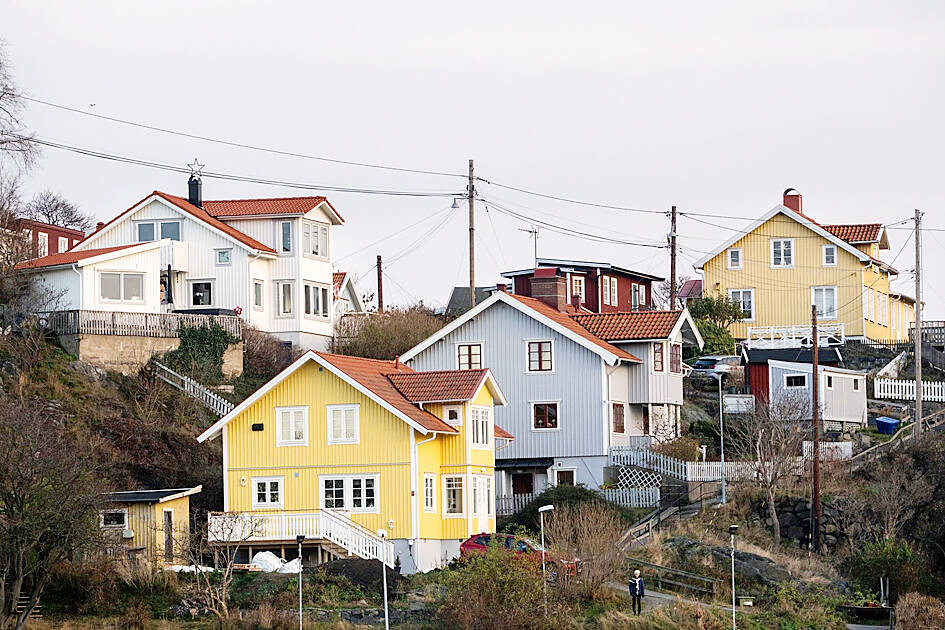The drop for home prices in Sweden continued unabated in the last month of last year, suggesting that this year could offer little relief for an already troubled housing market.
The overall market is down almost 17 percent since a peak in the spring, according to state-owned mortgage lender SBAB Bank AB, indicating that the 20 percent forecasts made by most economists — including the central bank — could prove too conservative.
The Nordic country is far from alone in suffering from falling property values. After booming during the COVID-19 pandemic, central bank interest-rate hikes have triggered a real-estate downturn in a number of nations globally, including in Canada, Australia and New Zealand.

Photo: Bloomberg
The new data sum up a bad year for Swedish home owners and real-estate firms, who are having to adjust to seeing the value of their properties fall in the wake of the surging cost of living and borrowing, and a gloomy economic outlook.
Last month, home prices fell 2 percent from the previous month, adjusted for seasonal variations, SBAB said yesterday, citing an indicator based on transaction data from its real-estate listing site Booli.
That follows a 2.2 percent decline in November and 2.3 percent in October.
“If unemployment were to increase significantly in the wake of the approaching recession, it’s important that mortgage rates do not continue to rise,” SBAB chief economist Robert Boije said in the statement, adding that this could lead to a “very difficult” situation for the housing market, which could also hit the production of new homes.
Prices for detached houses are now down 19 percent from the peak in the spring of last year, while apartment prices have fallen 14 percent.
The larger drop for house prices than apartments is in part explained by high electricity prices, which make it more costly to heat single-family homes.

RUN IT BACK: A succesful first project working with hyperscalers to design chips encouraged MediaTek to start a second project, aiming to hit stride in 2028 MediaTek Inc (聯發科), the world’s biggest smartphone chip supplier, yesterday said it is engaging a second hyperscaler to help design artificial intelligence (AI) accelerators used in data centers following a similar project expected to generate revenue streams soon. The first AI accelerator project is to bring in US$1 billion revenue next year and several billion US dollars more in 2027, MediaTek chief executive officer Rick Tsai (蔡力行) told a virtual investor conference yesterday. The second AI accelerator project is expected to contribute to revenue beginning in 2028, Tsai said. MediaTek yesterday raised its revenue forecast for the global AI accelerator used

Taiwan Semiconductor Manufacturing Co (TSMC, 台積電) has secured three construction permits for its plan to build a state-of-the-art A14 wafer fab in Taichung, and is likely to start construction soon, the Central Taiwan Science Park Bureau said yesterday. Speaking with CNA, Wang Chun-chieh (王俊傑), deputy director general of the science park bureau, said the world’s largest contract chipmaker has received three construction permits — one to build a fab to roll out sophisticated chips, another to build a central utility plant to provide water and electricity for the facility and the other to build three office buildings. With the three permits, TSMC

TEMPORARY TRUCE: China has made concessions to ease rare earth trade controls, among others, while Washington holds fire on a 100% tariff on all Chinese goods China is effectively suspending implementation of additional export controls on rare earth metals and terminating investigations targeting US companies in the semiconductor supply chain, the White House announced. The White House on Saturday issued a fact sheet outlining some details of the trade pact agreed to earlier in the week by US President Donald Trump and Chinese President Xi Jinping (習近平) that aimed to ease tensions between the world’s two largest economies. Under the deal, China is to issue general licenses valid for exports of rare earths, gallium, germanium, antimony and graphite “for the benefit of US end users and their suppliers

Dutch chipmaker Nexperia BV’s China unit yesterday said that it had established sufficient inventories of finished goods and works-in-progress, and that its supply chain remained secure and stable after its parent halted wafer supplies. The Dutch company suspended supplies of wafers to its Chinese assembly plant a week ago, calling it “a direct consequence of the local management’s recent failure to comply with the agreed contractual payment terms,” Reuters reported on Friday last week. Its China unit called Nexperia’s suspension “unilateral” and “extremely irresponsible,” adding that the Dutch parent’s claim about contractual payment was “misleading and highly deceptive,” according to a statement